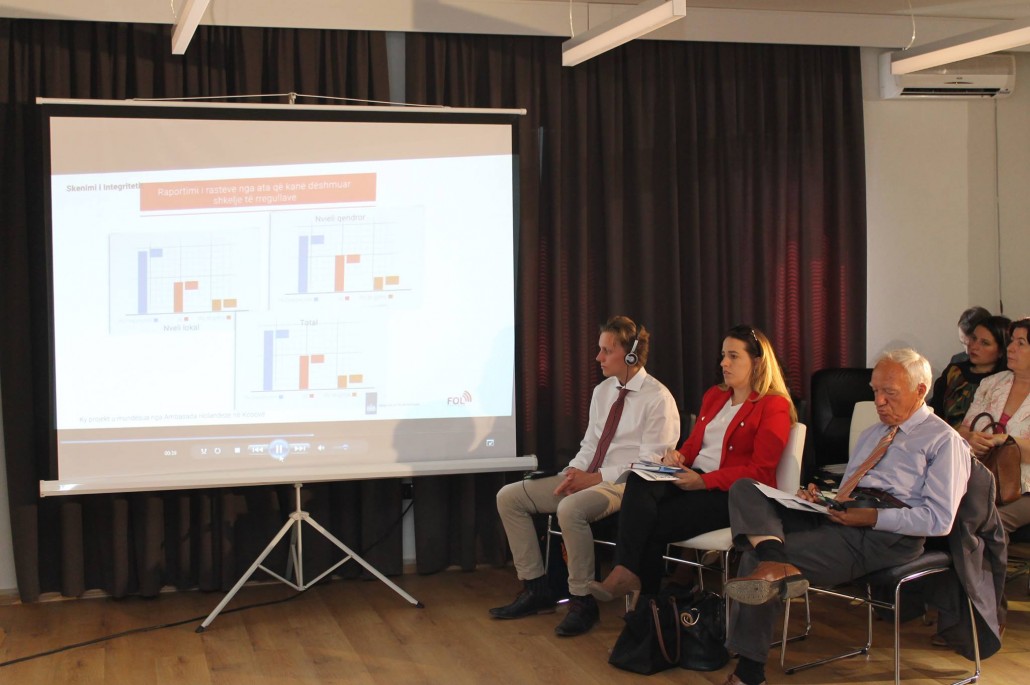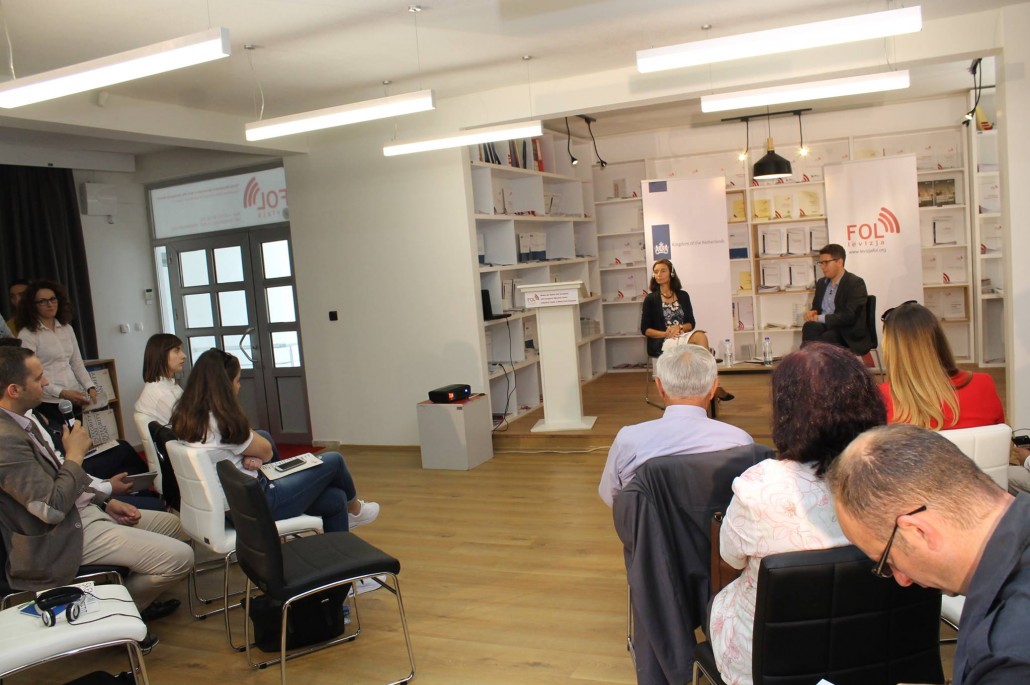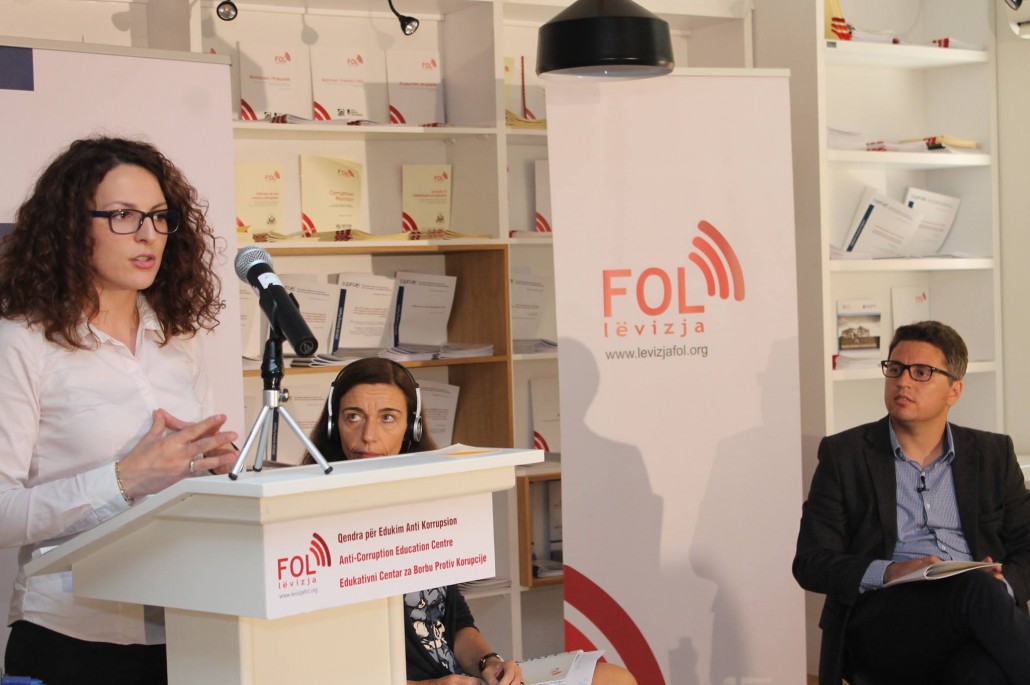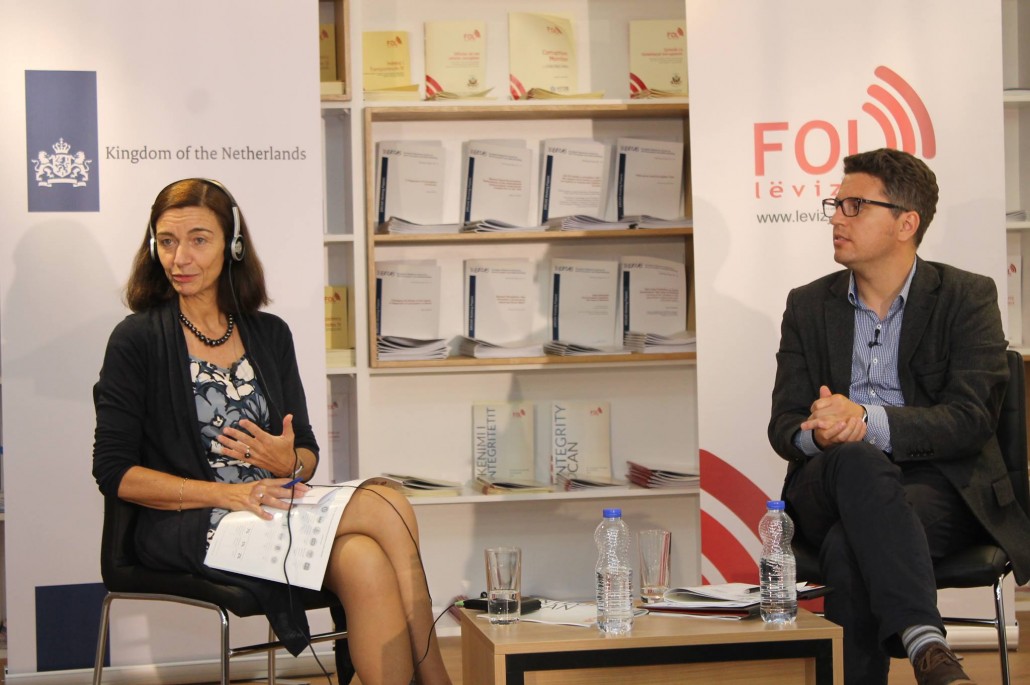Integrity Scan of the Institutions of Kosovo
Pristina, June 9th, 2016. In a press conference FOL Movement presented the findings of their report “Integrity Scan of the Institutions of Kosovo”. Invited in this conference was the Ambassador of the Netherlands in Kosovo, Mrs. Gerrie Williems.
Petrit Zogaj from FOL Movement said this report aims to identify main problems in our country regarding the level of integrity of public officials in local and central level.
“Our goal was to conduct this research in institutions to see what they think about themselves”-said Zogaj.
Fitore Metbala from FOL Movement said this study has been conducted with 1000 officials from public institutions from the central and local level. According to her in this study were included: The Office of the President, Government (the Office of the Prime Minister, as well as all other ministries), Kosovo’s Assembly, Independent Agencies, Regulatory Authorities, Kosovo’s Customs, the University of Prishtina, Public Enterprises, as well as the University Clinical Centre of Kosovo. “As for respecting the Law on Civil Service of the Republic of Kosovo, from the respondents we find that this law is more respected by civil servants than by the leaders of central/local institutions”-said Metbala. Regarding the conduct of civil servants, findings show that 63% from both levels, report breaches of the Code of Conduct.
“When respondents were asked on the frequency of involvement in corruption cases among the civil servants, a large part of them refused to answer, especially those who work at the central level (49%), while about 25 percent have answered with either ‘very often’ or ‘often’ to this question. Additionally, around 12 percent of the respondents think that the level of corruption in Kosovo’s civil service has increased compared to the previous 3 years”- she declared.
The Ambassador of the Netherlands in Kosovo, Mrs. Gerrie Willems, said that “Integrity Scan” contributes to transparency when it comes to integrity and corruption. “Rule of law is very important for the Embassy of Netherlands in Kosovo since it is a condition for sustainable development, just like the implementation of SAA with the EU, because it brings political and economic changes in Kosovo”-she said. According to her, fighting corruption and promoting integrity in workplaces has an important impact in rule of law.
“Around 40% do not want to talk about corruption in their public institutions, and this clearly shows the delicacy of the topic”-she said, adding that it is concerning when the cases of misconduct are not reported, because it shows they don’t believe in institutions.
Ambassador Willems emphasized the fact this report is the first of its kind since it focuses in the other side of the problem- as such it is opening up another angle of the debate on integrity and corruption.



Speech for the launch of the Integrity Scan report at FOL
I am glad to address you today at the launch of the 2016 Integrity Scan of the Kosovo Institutions. Let me begin by thanking the FOL staff for their laudable work in producing this report. I believe that the integrity scan provides some significant insight in how integrity is perceived by civil servants in the local and central institutions. In this way, FOL contributes to the much needed transparency about the issues of integrity and corruption.
Until now, there was an absence of any quantitative studies on integrity in Kosovo’s institutions. By producing the first report of its kind, FOL is opening up another angle of the debate on integrity and corruption. We are happy to have been able to support them in this work through our MATRA-fund.
• For the Netherlands and the EU, priorities on Kosovo are focused on the core values of the European Union. Among the foremost responsibilities is the respect for the Union’s fundamental values, notably the rule of law, democracy and fundamental rights.
• Rule of law is one of the core themes of the Netherlands Embassy in Kosovo. We strongly believe that rule of law is an essential precondition for sustainable development. The implementation of the SAA is a key element in this process. Together with FOL, many other organizations and the Kosovo authorities, we work towards this goal.
• In the framework of the rule of law, promoting transparency and accountability need special attention because they ensure essential guarantees for the functioning of democracy.
- It is clear that the fight against corruption and the promotion of integrity at the work floor plays an important role in the establishment of a strong rule of law. Not that long ago, during the opening of the anti-corruption education centre here at FOL, I stated that it is not a secret that Kosovo’s society is plagued by corruption. The report that is presented today shows us that this, unfortunately, is still true. Almost 40% of the respondents indicate that they do not want to talk about corruption in their public institutions. This clearly shows the delicacy of the topic which you as citizens and members of civil society should address.
- Additionally, around 12 percent of the respondents think that the level of corruption in Kosovo’s civil service has increased compared to the previous 3 years. This shows that there is still a lot of work to be done in a lot of institutions.
- Being more specific on integrity, I would also like to highlight two issues which deserve our special attention:
- The first issue is the reporting about instances of misconduct. Over 60% of the respondents indicate that they did not report any case of misconduct they encountered. The number one reason for not doing so is that they do not think that any action would be taken. This lack of trust in the functioning of the public institutions is worrisome and should be addressed.
2. This relates to the second topic that I would like to highlight. Nineteen percent of the respondents state that no action has been taken to inform the staff about the code of conduct. Informing people about the code of conduct is obviously the first step in improving integrity at public institutions. But fully implementing it is the core and crucial issue to be tackled.
• This said, I would like to conclude by saying that The Netherlands was, is and will remain a strong partner of Kosovo. You have our support on these challenges (be they on RoL or integrity issues) and they require commitment and ownership of Kosovo authorities. You, as citizens and members of civil society, also play an important role in demanding transparency and accountability.
• I want to thank you all, for your participation and attention. And I wish you a lot of success in your important work.
